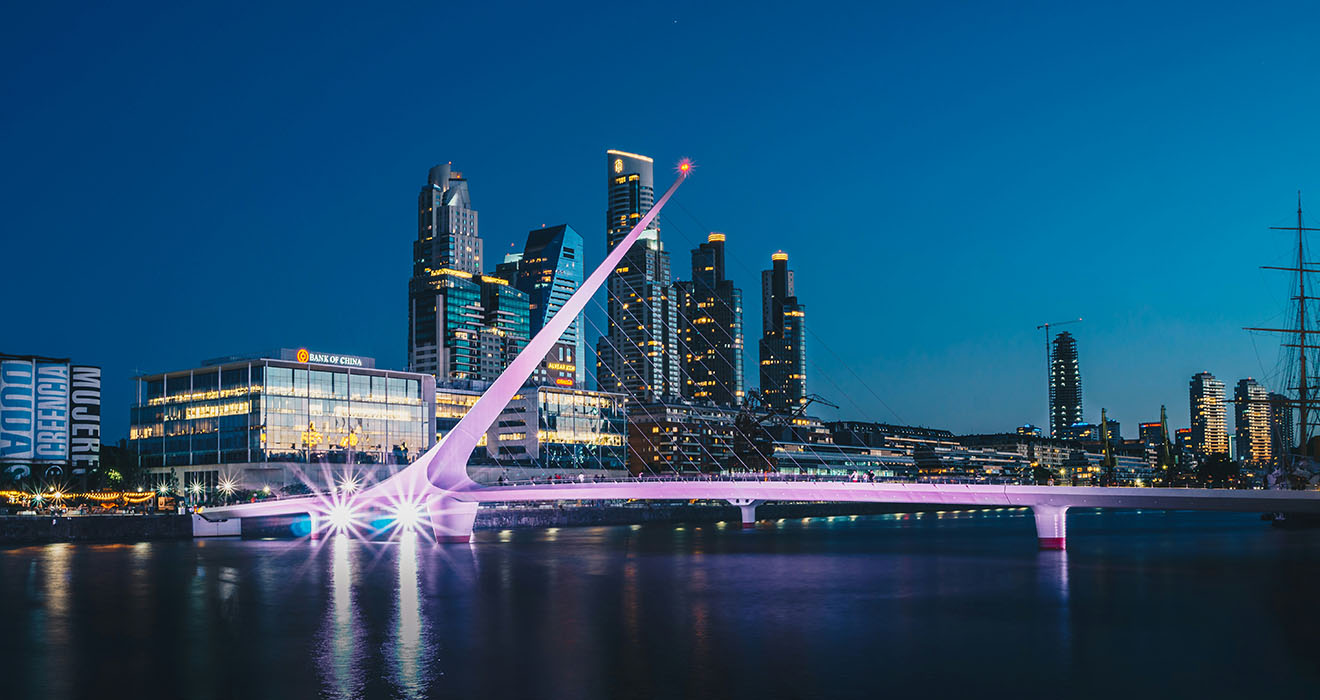Buenos Aires
The Paris of South America
About Buenos Aires
Buenos Aires, the capital of Argentina, is a vibrant and cosmopolitan city known for its rich cultural heritage, tango music and dance, and European-inspired architecture. From historic neighborhoods to modern attractions, Buenos Aires offers a diverse range of experiences for visitors.

Photo by Soliman Cifuentes on Unsplash
Getting There and Around
Arrival
Airports: Ministro Pistarini International Airport (EZE) and Aeroparque Jorge Newbery (AEP) are the main airports serving Buenos Aires.
Train Stations: Retiro Station is the central railway station for long-distance and suburban trains.
Bus Terminals: The main bus terminal is the Retiro Bus Station, offering connections to various destinations within Argentina and neighboring countries.
Transportation
Public Transport Options: Buenos Aires has an extensive public transportation system including buses, subways (known as 'Subte'), and commuter trains. The SUBE card is used for payment and can be purchased at kiosks and subway stations.
Car Rentals: Car rental services are available at the airports and downtown locations.
Bike Shares: The city offers a public bike-sharing system called Ecobici, providing a convenient way to explore the city on two wheels.
Tips: Taxis and ride-sharing services like Uber are also popular options for getting around the city.
Accommodations
Overview: Buenos Aires offers a wide range of accommodations, from luxury hotels to budget-friendly hostels and boutique guesthouses.
Types of Accommodations: Visitors can choose from hotels, hostels, guesthouses, and apartment rentals, catering to different preferences and budgets.
Booking Tips: It's advisable to book accommodations in advance, especially during peak tourist seasons.
Local Regulations and Safety: Ensure that the chosen accommodation complies with local safety regulations and standards.
Accessibility: Many accommodations offer facilities for guests with disabilities, but it's recommended to inquire about accessibility features before booking.
Recoleta
Known for its upscale hotels, cultural attractions, and elegant architecture.
Palermo
A trendy neighborhood with a variety of accommodation options, vibrant nightlife, and green spaces.
San Telmo
Famous for its historic charm, cobblestone streets, and antique markets.
Puerto Madero
Offering luxurious waterfront hotels and fine dining experiences.
Microcentro
Ideal for business travelers, with proximity to major attractions and corporate centers.
Attractions and Activities
Plaza de Mayo
The main square in Buenos Aires, surrounded by significant historical buildings and landmarks.
Obelisco de Buenos Aires
An iconic monument located on Avenida 9 de Julio, symbolizing the city's identity.
Casa Rosada
The presidential palace known for its distinctive pink color and historical significance.
La Boca Neighborhood
Famous for its colorful houses, tango performances, and Caminito street.
Teatro Colon
One of the world's top opera houses, renowned for its architectural grandeur and artistic performances.
Dining and Nightlife
Culinary Scene
Buenos Aires boasts a diverse culinary scene, blending traditional Argentine flavors with international influences. Visitors can savor delicious steaks, empanadas, and regional dishes, along with gourmet dining experiences and fusion cuisine.
Puerto Madero
Waterfront restaurants offering upscale dining and scenic views of the Rio de la Plata.
Palermo Hollywood
A trendy district with a vibrant food scene, featuring diverse eateries, cafes, and international cuisines.
San Telmo
Charming bistros, traditional parrillas, and cozy cafes amidst historic surroundings.
Recoleta
Elegant dining establishments, wine bars, and culinary experiences in a refined setting.
Las Cañitas
A lively area known for its variety of restaurants, bars, and nightlife options.
Festivals and Events
Carnaval Porteño
Colorful parades, music, and dancing during the carnival season, celebrated in February or March.
Feria Internacional del Libro de Buenos Aires
One of the largest book fairs in the Spanish-speaking world, held annually in April and May.
Buenos Aires Tango Festival
A celebration of tango music and dance, featuring performances, workshops, and competitions in August.
Fiesta Nacional de la Flor
A flower festival showcasing floral displays, gardening exhibits, and horticultural attractions in September.
Buenos Aires International Jazz Festival
An acclaimed jazz event featuring concerts, jam sessions, and masterclasses, typically held in November.
Practical Information
Safety Tips
Exercise caution in crowded areas and be mindful of personal belongings to prevent theft. Stay informed about local safety advisories and emergency procedures.
Healthcare
Pharmacies: Pharmacies (farmacias) are widely available throughout the city, with some operating 24 hours for emergency medication needs.
Hospitals: Buenos Aires has modern hospitals and medical facilities, with both public and private healthcare options for residents and visitors.
Emergency Services: In case of emergencies, dial 911 for immediate assistance or seek help at the nearest police station or hospital.
Currency and Payment
Local Currency: The official currency is the Argentine Peso (ARS). ATMs are widely available for cash withdrawals, and credit cards are accepted at most establishments.
Tipping Customs: Tipping is not mandatory but is appreciated for good service, typically around 10% of the bill in restaurants and for other services.
Payment Methods Accepted: Major credit cards such as Visa and Mastercard are commonly accepted, while some businesses may prefer cash payments.
Connectivity
Mobile Networks: Several mobile network providers offer prepaid SIM cards for tourists, providing access to voice, data, and messaging services.
SIM Cards: Tourists can purchase SIM cards from authorized retailers or mobile phone shops, requiring a valid ID for registration.
WiFi: Many cafes, restaurants, and public spaces offer free Wi-Fi access, and some accommodations provide complimentary internet connectivity for guests.
Local Customs and Etiquette
Culture Insights
Argentines are known for their passion for tango, soccer, and lively social gatherings. Respect for family, friends, and community is deeply ingrained in the culture.
Greetings
A warm handshake and a friendly kiss on the cheek are common greetings among acquaintances. Address people using their titles and last names unless invited to use their first names.
Social Behavior
Engage in conversations about topics such as sports, food, and cultural interests. Personal space is valued, so maintain an appropriate distance when interacting with others.
Cultural Taboos
Avoid discussing sensitive political issues or making comparisons between regions within Argentina. Refrain from arriving punctually for social events, as it is customary to arrive slightly later than the specified time.